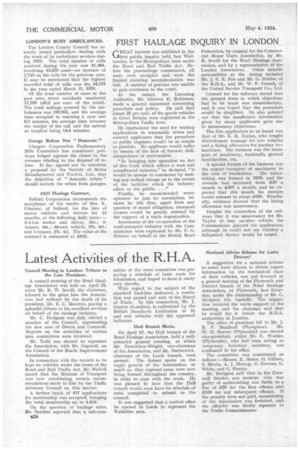FIRST HAULAGE INQUIRY IN LONDON.
Page 38

If you've noticed an error in this article please click here to report it so we can fix it.
GREAT interest was exhibited in the first public inquiry held, last Wednesday, in the Metropolitan Area under the Road and Rail Traffic Act. Before the proceedings commenced, all seats were occupied and soon the limited standing accommodation was full. A number of persons was unable to gain admission to the court.
At the outset, the Licensing Authority, Mr. Gleeson E. Robinson, made a general statement concerning procedure and policy. He said that about 25 per cent. of the goods vehicles in Great Britain were registered in the Metropolitan Traffic Area.
He emphasized the need for making applications in reasonable terms and assured applicants that the procedure at public inquiries would he as simple as possible. No applicant would suffer by reason of the Jack of forensic skill, inexperience or nervousness.
"In bringing into operation an Act of this kind, which affects a vast and complicated industry," he declared, "it would be unwise to commence by making any radical change as to the extent of the facilities which the industry offers to the public. . . ."
Finally, he recommended every operator to join an association, because he felt that, apart from any question of moral obligation, transport owners would be greatly assisted by the support of a trade organization.
Assurances of the co-operation of the road-transport industry with the Commissioner were expressed by Mr. F. G. Bristow on behalf of the British Road Federation, by counsel for the Commercial Motor Users Association, by Mr. R. Sewill for the Road Haulage Association, and by a representative of the London Association. Other notable personalities at the Fitting included Mr. J. F. E. Pye and Mr. G. Hotter, of the R.H.A., and Mr. W. F. French, of the United Service Transport Co., Ltd.
Counsel for the railways stated that the present form in which objections had to be made was unsatisfactory, and it was hoped that the procedure would be simplified. He also pointed out that the insufficient information given by many applicants gave rise to unnecessary objections.
The first application to be heard was that of Mr. E. R. Taylor, who sought discretionary tonnage for two vehicles and a hiring allowance for another two machines. His business was the trans. port of machinery, foodstuffs, general merchandise, etc.
A special feature of his business was the urgent transport of machinery in the case of breakdown. His undertaking was formed in 1930, and the revenue had increased from £47 a month to £367 a month, and he expected that this month his receipts would amount to about £600. Eventually, evidence showed that the hiring allowance was unnecessary.
Despite the contention of the railways that it was unnecessary for Mr. Taylor to buy another vehicle, the Commissioner granted the application, although he could not say whether a full-period licence would be issued.




























































































